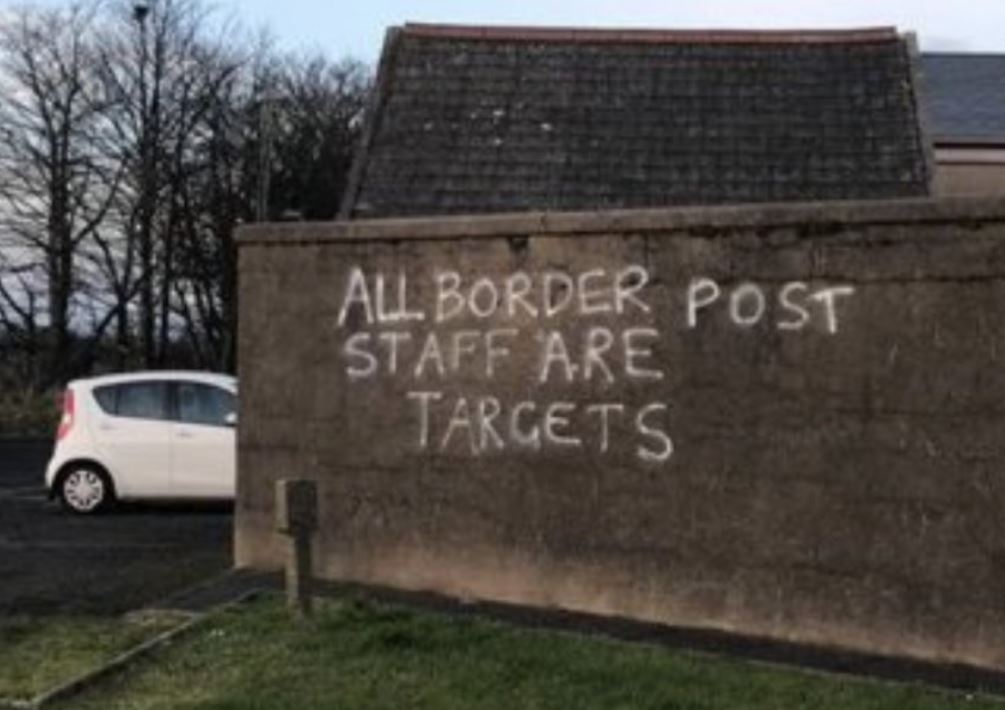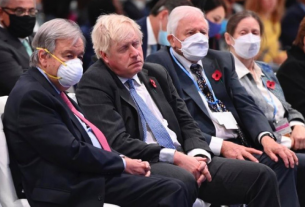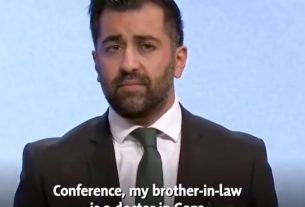Arlene Foster claims she is “absolutely astounded” at suggestions her Democratic Unionist Party is stoking tensions to undermine the Northern Ireland protocol that has rocked post Brexit relations and put at risk the Good Friday Agreement.
Foster’s comments follows revelations that border staff at Northern Ireland’s ports were stood down by a DUP minister who dismissed as incomplete the police assessment of the risk to the workers.
The Police Service of Northern Ireland (PSNI) told Edwin Poots the threat to port workers was a “low level” risk linked to activities such as online postings and graffiti, the Belfast Telegraph reports. However, the minister of agriculture expressed doubts the PSNI had a “full understanding of the risks” to port workers and he decided action was needed on Monday evening – only hours before a planned meeting with the PSNI to discuss the issue.
It meant checks on goods arriving from GB were suspended after Poots ordered the inspectors to stand down, and followed the local council’s vote to withdraw their staff from Larne port.
Mid and East Antrim Council expressed their concerns to Poots about an “upsurge in sinister and menacing behaviour in recent weeks”, and also voiced their disputing of the PSNI’s assessment about the risk to workers safety the ports. Police however, insist no evidence exists that loyalist paramilitaries are involved and instead point the finger at individuals and small groups acting online and daubing graffiti.
Poots’ order was one of his last as a minister in office, coming just before he temporarily stepped down (at midnight on Monday) to undergo cancer surgery. A post-op Poots tweeted on Wednesday his thanks to “the amazing NHS staff” and declared: “The surgery is curative and I can’t believe how well I feel. Thanks also for all the kind messages and prayers, God has answered them mightily.”
Crisis within a month as Brexit picks open scab over NI’s delicate peace
While Poots recovers, top level meetings between politicians in Northern Ireland, Dublin, London and Brussels are scrambling to find a “curative” solution to the fall out from the agriculture minister’s action, the latest twist in the perennial problems that define the Northern Ireland state.
Brexit has picked open the scab that had been slowly healing over the years of Britain and Ireland’s shared membership of a political and economic union that managed to dissolve borders and sought to neutralise the divisiveness of difference.
This latest crisis has taken less than a month to become manifest – and has been compounded by Brexit and amplified by the Covid pandemic and populist vaccine-nationalism.
The latter saw the EU act unilaterally last Friday and actually trigger article 16 of the Brexit deal, effectively creating a border on the island of Ireland in a disastrous attempt to prevent EU manufactured vaccines entering the UK through Northern Ireland.
A very fast U-turn followed as the EU’s blatant hypocrisy and apparent contempt for the Good Friday Agreement was called out and universally condemned.
Minister ‘not convinced police had full understanding of the risks’
Deputy first minister Michelle O’Neill called it a “huge mistake” and expressed concern that the DUP would seize on the opportunity to “attack the protocol”.
Poots’ decision to withdraw workers – despite the PSNI’s assessment of a “low level” threat – was considered by the agriculture committee at Stormont, who heard: “He [Poots] stated that he was very concerned about risks posed to staff and he was not convinced that the PSNI had a full understanding of the risk”.
The extraordinary statement about such a seismic decision was questioned by Sinn Fein committee member Philip McGuigan, who concluded the order to suspend checks appeared to have been “heavily influenced and driven by the minister”.
‘A sinister and ugly development’
DUP committee member Harry Harvey however, partisan-allly praised Poots saying early decisions are best for “health and safety”, while expressing his gratitude “the minister is putting” officials’ and their “department’s safety first”.
A statement by Poots, reported by the pro-nationalist Irish News on Tuesday, revealed motives beyond the health and safety of port workers had influenced his decision.
Poots said: “The Protocol, as has been established, has made Great Britain a third country to Northern Ireland when we are all part of the sovereign UK.
“The EU laws that have been established to deal with materials coming in from third countries such as Brazil and Argentina is a totally disproportionate application to have that applied to Great Britain whenever Northern Ireland is part of the UK, remains part of the UK, but over 50% of our trade in foodstuffs is coming from Great Britain and the impact upon the people of Northern Ireland is immense.”
Following yesterday’s (February 3) meeting between London, Brussels and Stormont’s joint heads of government – Foster and O’Neill – the Sinn Fein vice-president updated local businesses and reminded of the importance to “work collectively in mitigating the impact of Brexit.”
In a subsequent tweet O’Neill said: “We need to see mature leadership from across the political spectrum. The reckless whipping up of hysteria must end and the energy instead placed into giving certainty to businesses and citizens.
“All political parties must work with common purpose to deliver solutions to issues.”
DUP’s coordinated attack to undermine NI protocol
Joint head of Northern Ireland’s government/first minister Foster rejected accusations she is “whipping up hysteria” around the issue, despite announcing what the pro-Unionist Belfast Telegraph calls “a co-ordinated bid to undermine the Northern Ireland Protocol in Belfast and London.”
This morning (Thursday) Foster told listeners of BBC Radio Ulster’s Good Morning Ulster programme that all of Northern Ireland’s unionist politicians are opposed to the protocol and feared the return of “majoritarianism” after years of being told it doesn’t work in Northern Ireland.
“[B]ut it appears now that majoritarianism is back and if we don’t like it [the protocol] then we have to suck it up,” the first minister said, dismissing the idea of any extension to the grace period as a “sticking plaster”.
“People need to take their heads out of the sand, take their fingers out of their ears and actually listen to what people are having to deal with here in Northern Ireland,” said an impassioned Foster.
‘A very sinister and ugly development’ – says taoiseach
Elsewhere on BBC radio the chairman of the Loyalist Communities Council (LCC) – a body representing loyalist paramilitary groups the Ulster Defence Association (UDA), Ulster Volunteer Force (UVF) and the Red Hand Commando – said it may be necessary to “fight physically to maintain our freedoms within the UK”.
The LCC’s David Campbell is the latest to be accused of ramping up tensions with his “dangerous and reckless” comments made on the popular Nolan Show on BBC Radio Ulster yesterday.
When asked if he thought the days of violence were over, Campbell said he “hoped so”, before adding: “[B]ut who knows what the world has in store for any of us in the future?
“If it comes to the bit where we have to fight to maintain our freedoms within the United Kingdom then so be it.”
Ireland’s taoiseach Micheál Martin called the suspension of physical Brexit checks at Larne and Belfast ports because of safety concerns for workers, a very “sinister and ugly development”; while Boris Johnson – who famously broke his very public promise to the DUP that there would not be a GB-NI border in the Irish Sea – said the EU had “undermined the protocol and understandably provoked concern”.
The prime minister vowed his “commitment to the people of Northern Ireland and our Union is unshakeable”, while tweeting: “Let me underline that, now & in the future, Northern Ireland’s place in the UK will be protected and strengthened.
“What is needed is urgent action from the EU to resolve outstanding problems with Protocol implementation, so as to preserve the gains of the Belfast Good Friday Agreement & ensure that Northern Ireland benefits from Brexit just like every other part of our United Kingdom.”




